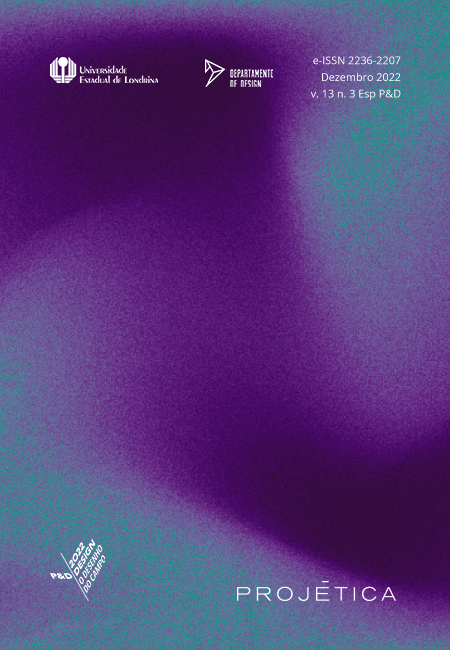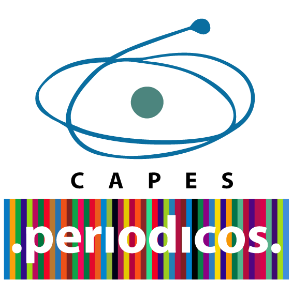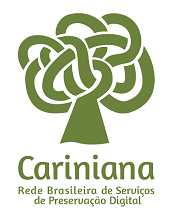Between rockets, stars, and pens:
experience report on teaching Computing principles to undergraduate Design students
DOI:
https://doi.org/10.5433/2236-2207.2022v13n3p166Keywords:
Teaching;, Computational Design;, Computing.Abstract
In the last 20 years, computational design and generative design disciplines became more present in undergraduate Design students' interests and practices. Nonetheless, students still face barriers for learning Computing principles, concepts, practices, and perspectives, such as the lack of theoretical foundations, and difficulties to use programing environments created for other areas. This paper presents an experience report on teaching Computing principles at the undergraduate Design course at Ufes, using a specific teaching approach designed for this audience. For two terms, a total of 150 students tested the approach and developed around 2600 programs, whose structures and execution illustrate problem-solving processes within the scope of the didactic approach. Preliminary results suggest that the approach promoted learning of Computing concepts, fostered collaboration between apprentices, and provided opportunities for individual expression through programming.
Downloads
References
ABRIC, J. C. Central System, Peripheral System: their functions and role in the dynamics of Social Representations. Papers on Social Representations, v. 2, n. 2, p. 75-78, 1993.
ABRIC, J. C. Prácticas Sociales, Representaciones Sociales. Em: ABRIC, J. C. (Ed.). . Prácticas sociales y representaciones. D.F. México: Ediciones Coyoacán, 2001.
AZEVEDO, E.; CONCI, A.; LETA, F. R. Computação Gráfica: Geração de Imagens. Rio de Janeiro: Campus, 2008. v. 1
BLANCHET, A. As unidades procedimentais, causais e teleonômicas no estudo dos processos cognitivos. Em: O percurso das descobertas das crianças: pesquisas sobre as microgêneses cognitivas. Lisboa: Instituto Piaget, 1997.
BRENNAN, K.; RESNICK, M. New frameworks for studying and assessing the development of computational thinking. Proceedings of the 2012 annual meeting of the American educational research association, Vancouver, Canada. Anais...2012.
BUHAMDAN, S.; ALWISY, A.; BOUFERGUENE, A. Generative systems in the architecture, engineering and construction industry: A systematic review and analysis. International Journal of Architectural Computing, v. 19, n. 3, p. 226-249, 1 set. 2021. DOI: https://doi.org/10.1177/1478077120934126
DENNING, P. J. Great Principles in Computing Curricula. Proceedings of the 35th SIGCSE Technical Symposium on Computer Science Education. Anais...: SIGCSE '04.New York, NY, USA: ACM, 2004. Disponível em: <http://doi.acm.org/10.1145/971300.971303> DOI: https://doi.org/10.1145/971300.971303
DENNING, P. J.; MARTELL, C. H. Great Principles of Computing. Cambridge: MIT Press, 2015. DOI: https://doi.org/10.7551/mitpress/9809.001.0001
DENNING, P. J.; TEDRE, M. Computational Thinking: A disciplinary perspective. Informatics in Education, v. 20, n. 1, p. 361-390, 2021. DOI: https://doi.org/10.15388/infedu.2021.21
HAREL, I.; PAPERT, S. Constructionism. New York: Ablex Publishing, 1991.
IEPSEN, E. F. Lógica de Programação e Algoritmos com JavaScript. São Paulo: Novatec, 2018.
IERUSALIMSCHY, R. Programming in Lua. 2. ed. Rio de Janeiro: Lua.org, 2014.
KNUTH, D. The Art of Computer Programming. 3. ed. Massachusetts: Addison-Wesley, 1997. v. 1
MALONEY, J. et al. The scratch programming language and environment. ACM Transactions on Computing Education (TOCE), v. 10, n. 4, p. 16, 2010. DOI: https://doi.org/10.1145/1868358.1868363
MARJI, M. Aprenda a Programar com Scratch. São Paulo: Novatec, 2014.
MOSCOVICI, S. Representações Sociais: investigações em psicologia social. Petrópolis: Vozes, 2003.
PAPERT, S. On making a theorem for a child. Proceedings of the ACM annual conference-Volume 1. Anais...ACM, 1972. DOI: https://doi.org/10.1145/800193.569942
PAPERT, S. Mindstorms: Children, computers, and powerful ideas. New York: Basic Books, 1980.
PERKINS, D. N.; SALOMON, G. Transfer of learning. Em: International Encyclopedia of Education. Oxford: Pergamon Press, 1992. v. 2p. 6452-6457.
REAS, C.; FRY, B. Processing: A Programming Handbook for Visual Designers and Artists. Cambridge: MIT Press, 2007.
SÁ, C. P. Núcleo Central das Representações Sociais. Rio de Janeiro: Vozes, 1996.
SAADA-ROBERT, M. A construção microgenética de um esquema elementar. Em: O percurso das descobertas da criança: pesquisa sobre as microgêneses cognitivas. Lisboa: Instituto Piaget, 1997.
SANT'ANNA, H. C. A construção de narrativas multimídia na perspectiva da Zona de Desenvolvimento Proximal de Vygotsky e da Pós-Produção de Bourriaud como apoio ao processo de aprendizagem digital. Anais Eletrônicos do 3o Simpósio Hipertexto e Tecnologias na Educação. Anais... Em: 3o SIMPÓSIO HIPERTEXTO E TECNOLOGIAS NA EDUCAÇÃO. Recife: NEHTE, 2010.
SANT'ANNA, H. C. et al. Da Arte Generativa ao Pensamento Computacional - Uma análise comparativa das plataformas de aprendizagem. Anais do 11o Encontro Internacional de Arte e Tecnologia. Anais... Em: 11o ART. Brasília: Departamento de Artes Visuais / UnB, 2012.
SANT'ANNA, H. C. Ação, Computação, Representação: uma investigação psicogenética sobre o desenvolvimento do Pensamento Computacional. Doutorado em Psicologia—Vitória: Universidade Federal do Espírito Santo, 2014.
SANT'ANNA, H. C. Revisão crítica das aplicações de Aprendizado de Máquina no Design Visual: bases teóricas, desempenho dos modelos e novos paradigmas de projeto. Anais do SIIMI/2019 VI Simpósio Internacional de Inovação em Mídias Interativas. Anais... Em: SIIMI/2019 VI SIMPÓSIO INTERNACIONAL DE INOVAÇÃO EM MÍDIAS INTERATIVAS. Buenos Aires: Medialab/UFG, 2019.
SANT'ANNA, H. C.; NEVES, V. B. Scratch Day UFES: oficina itinerante de introdução à programação para professores. Anais Eletrônicos. Anais... Em: 4o SIMPÓSIO HIPERTEXTO E TECNOLOGIAS NA EDUCAÇÃO. Recife: NEHTE, 2012.
WING, J. M. Computational Thinking. Communications of the ACM, v. 49, n. 3, p. 33-35, mar. 2006. DOI: https://doi.org/10.1145/1118178.1118215
WING, J. M. Computational thinking and thinking about computing. Philosophical Transactions of the Royal Society of London A: Mathematical, Physical and Engineering Sciences, v. 366, n. 1881, p. 3717-3725, 28 out. 2008. DOI: https://doi.org/10.1098/rsta.2008.0118
Downloads
Additional Files
Published
How to Cite
Issue
Section
License

This work is licensed under a Creative Commons Attribution 4.0 International License.
Projética está licenciada sob a Creative Commons Attribution CC-BY 4.0 International. Os autores detém os direitos autorais e concedem à revista o direito de exclusividade de primeira publicação.
Os autores dos trabalhos aprovados autorizam Projética a, após a publicação, ceder seu conteúdo para reprodução em indexadores de conteúdo, bibliotecas virtuais e similares.
Os autores assumem que os textos submetidos à publicação são de sua criação original, responsabilizando-se inteiramente por seu conteúdo em caso de eventual impugnação por parte de terceiros. As opiniões emitidas pelos autores dos artigos são de sua exclusiva responsabilidade.
A revista se reserva o direito de efetuar, nos originais, alterações de ordem normativa, ortográfica e gramatical, com vistas a manter o padrão culto da língua e a credibilidade do veículo. Respeitará, no entanto, o estilo de escrever dos autores. Alterações, correções ou sugestões de ordem conceitual serão encaminhadas aos autores, quando necessário. Nesses casos, os artigos, depois de adequados, deverão ser submetidos a nova apreciação. As provas finais não serão encaminhadas aos autores.












